ICC Adopts New Set of Rules for DOCDEX
The International Chamber of Commerce (ICC) Banking Commission unanimously adopted revised rules for Documentary Credit Dispute Resolution by Expertise (DOCDEX) as of 06.November.2014.
Why Docdex Rules Have Been Revised?
When the original rules began to show their limits, whether in terms of managing the expert appointment process, dealing with unwarranted delays or struggling to find an answer to unexpected procedural challenges, it was decided in 2012 to start a comprehensive revision of the rules, in both their scope and administration.
What are the Main Amendment Points of the new Docdex Rules:
- Enlarged scope: Building on the untapped expertise in the commission, the new DOCDEX rules enjoy an enlarged scope that make them available to any trade finance-related dispute whether or not a set of ICC Banking Commission rules applies. This enlargement, however, comes with strict conditions that ensure a peaceful transition. They include the requirement that both the claimant and the respondent consent to have their case submitted to DOCDEX where the claim relates to a trade finance instrument that is not governed by a set of ICC Banking Commission rules.
- More transparency: The process for the appointment of experts was profoundly revised. Prospective experts are now required to state from the inception their availability, independence and impartiality to serve as appointed experts. A number of ethical safeguards are added to the process to ensure that a person having served as a DOCDEX expert is barred from any further involvement in the dispute under any other capacity.
- More straightforward processing: One of the key attractiveness of DOCDEX is the rapidity of the decision rendering process: 30 days from the experts’ reception of the file. The new rules offer a new approach to the various submissions and communications by imposing the principle of electronic submissions according to standard templates available online. This change is expected to curb administrative delays and ultimately result in faster and better processed proceedings.
About Docdex:
First issued in 1997, and revised in 2002, the DOCDEX rules have grown to become a trusted dispute resolution system for documentary credits, demand guarantees and collections that are governed by ICC Banking Commission rules.
Jointly created by the ICC Banking Commission and the ICC Commission on Arbitration and ADR, DOCDEX is currently administered by the ICC International Centre for ADR.
Since its inception, 140 decisions have been rendered by DOCDEX panels, helping avert costly and protracted litigation.





